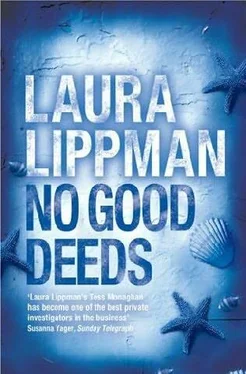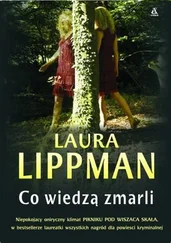“So?”
“So the kid, Le’andro Watkins, was the one who was supposed to handle the ATM card, but he passed it on to someone else-my source. My source talks, Le’andro is killed.”
“These things happen.”
“Exactly. Young black kids get shot and killed in East Baltimore. And, by the way, men who live secret lives sometimes end up on the wrong side of a trick, too. ‘These things happen.’ But what if they’re happening this time because someone knows what it looks like, how the crimes will be perceived? We have two homicides that are meant to look like something they’re not. That’s the connection.”
Wilma was settling down, listening to Tess’s words, allowing intellect to trump emotion. Met under the best of circumstances, Wilma Youssef was never going to be a kindred spirit. She struck Tess as incurious and self-centered, a woman who lived her entire life as if she inhabited some abstract gated community where all evil could be kept at bay. Her religious beliefs and early good fortune in life had made her smug, dogmatic.
But for Tess to dismiss her because they agreed on so little would be no different from Wilma’s disdain for “those people.” She was a widow, a single mother trying to perform in a job that was demanding and exhausting under any conditions. She yearned for the truth, but she was terrified of it, too.
And that, more than anything, seemed to Tess the universal human condition.
“If I open the box and what’s inside doesn’t have any relevance to Greg’s death, will you agree to keep it confidential?”
Tess wondered just where Wilma’s imagination had taken her over the past few months. Some very dark places, no doubt, places far scarier than any gossiping nurse could imagine.
“Absolutely. But we need to expedite this, okay? I don’t know how it’s done-you’re the lawyer-but there’s got to be a way for you, as your husband’s heir, to get into that safe-deposit box quickly. Maybe a judge in Orphans’ Court, maybe-”
“A judge already has ruled,” Wilma said, sheepish for once. “It’s actually pretty automatic when a spouse dies. In fact, the bank has told me they’ll open it for me whenever I can make it in.”
“So why haven’t you examined its contents if you had the right all along?”
Wilma shook her head, clearly not trusting herself to speak for a few seconds, then said, “Pandora’s box, you know? I’m scared what might be unleashed.”
“Hope was in Pandora’s box, too. Don’t forget that. The last thing that came out was hope.”
Gabe could tell that Collins was surprised by the invite-a drink? just the two of us?-prompting another bout of anxiety for Gabe. What if he really does think I’m a fag? The rejoinder in his head- but he’s black, and I’m not into black chicks, so why would I be into black guys? -made him feel only more squirmy and strange. Even on the telephone with Collins, he felt awkward and tongue-tied, like he was a teenager calling a girl.
But all Collins said, after an interminable pause, was “Okay, where?”
Even that simple question provoked another round of second-guessing. It had to be a guy -guy place, but not so obvious a guy place that it would look like Gabe was insecure about that stuff. Besides, a sports bar would be too rowdy for conversation.
“Um, that martini bar? The new one on Canton Square?”
“Sure,” Collins said. “What time?”
“Eight?”
Shit, he had to figure out a way to stop speaking in questions around the guy. He decided to get to the bar early, so he’d have a drink in progress, be in control of the situation. But the lack of street parking undermined him, and he arrived fifteen minutes late, which clearly irritated Collins. Gabe’s rushed apology, his explanation that he had parked far away, didn’t seem to help much.
But once Gabe got going, laid out the connections he had uncovered, he could tell that Collins was impressed.
“Do you know for a fact that this Keyes guy helped to hide the source and her boyfriend?”
“No, but we always figured they went by car, right? It’s the beach, off season. The locals probably notice every out-of-towner, especially some salt-and-pepper combo.”
Shit, what he wouldn’t have given to take that back.
Collins took a long swallow of his Heineken. He was drinking from a glass, which made Gabe feel as if there were something unmanly about settling for a bottle, Sam Adams at that, although he was drinking shots of Jameson on the side.
“What makes you so sure,” Collins said, “that the informant is black? The fact that he bought Nikes at the Downtown Locker Room? Could be some punk-ass whigger, you know.”
“Um, I didn’t-Imean…”
Collins smiled, gave him a playful punch in the shoulder, one hard enough to leave a bruise. “I’m just busting balls. Of course the source is a black kid. Just like…”
“Just like?”
“Just like the ATM photo. Can’t see his face, but we can see his hands.”
“Right,” Gabe said. “Of course.” He wasn’t a bigot. He had simply forgotten how he knew what he knew.
“You keeping this close, this insight to where they might be? Or have you gone to Schulian, opened up an official file?”
“Hell, no. It’s our secret so far. I haven’t even told Jenkins.” Gabe was feeling the rush of camaraderie now, burbling in spite of himself. “I gotta say, I don’t have utter confidence in him. Those FBI guys are so full of themselves. I mean, what’s he ever done? You, you’ve been out there, did undercover. You risked your life.” He sensed he was entering dangerous territory, but he decided to chance it. “That was bullshit, what they put you through.”
“Before your time. How do you know of it?”
“People talk.” Collins clearly didn’t like the idea of being gossiped about, so Gabe quickly added, “Everyone thinks you got a raw deal.”
“It turned out okay. The lawsuits were dismissed. You can’t sue a federal agent doing his job-even when he botches it and shoots a citizen.”
“But it ended your time undercover after the newspaper ran your photo, and I heard you were one of the best. That sucks. It was an honest mistake, under the circumstances.”
Collins, back in his usual taciturn mode, said nothing, but Gabe thought he caught a wisp of a smile on his face, a moment of understanding. Finally, with Jenkins out of the way, they were bonding.
“Another round?” he asked. “My treat.”
“Sure,” Collins said. “Night’s young. Night’s so young that R. Kelly would date it.”
It was almost midnight when Gabe and Collins finally left the bar. Gabe was a little lit-not so much that he couldn’t drive, given that it was basically a series of straight shots and left turns until he coasted into his parking pad off Hanover. He just felt fuzzy around the edges. The air was soft, the first true spring evening so far. The season got here a little faster here than it did in Jersey, not even two hundred miles to the north. Just twenty-four hours ago, the Yankees had almost been sleeted out on Opening Day in the Bronx, but here you could see buds on the trees.
“Where you parked?” Collins asked.
He had to think about it. “I’m on Fait, like four blocks from here.”
“I’m around the corner from there,” Collins said. “I remember when this neighborhood was nothing but toothless old Polacks, the kind who would call the police if a black kid so much as rode his bike down the sidewalk.”
It was the longest sentence Collins had ever uttered in Gabe’s presence. It was so cool, them becoming friends. He could ask Collins about being a star on the Poets, or whatever that local basketball team was called. Hadn’t Juan Dixon played for them? Steve Francis? Somebody good in the NBA.
Читать дальше












